9th International Conference on Ecosystems and Sustainable Development
Bucharest, Romania
Overview
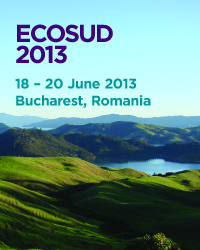
The ninth International Conference on Ecosystems and Sustainable Development (ECOSUD/13) took place in Bucharest, organised by Prof Carlos A Brebbia, representing the Wessex Institute of Technology, UK, and Prof Anca Marinov of the University Politehnica of Bucharest in Romania
This successful series started in Peniscola, Spain (1997) and continued in Lemnos, Greece (1999); Alicante, Spain (2001); Siena, Italy (2003); Cadiz, Spain (2005); Coimbra, Portugal (2007); Chianciano Terme, Italy (2009) and Alicante, Spain (2011).
The aim of the conference is to encourage and facilitate interdisciplinary communication between scientists, engineers, economists and other professionals working in ecological systems and sustainable developments. Emphasis is given to those areas that will benefit from the application of scientific methods for sustainable development, including the conservation of natural systems around the world. The conference objectives have evolved over the years, seeking to integrate thermodynamics, ecology and economics into the new discipline of ecodynamics.
ECOSUD is a challenge for the creation of this new science in line with Prigogine’s statement that ‘at all levels we observe events associated with the emergence of novelties and narrative elements, which we may associate with the creative power of nature’.
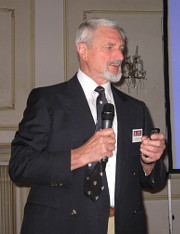
The ECOSUD conference papers for instance are published in paper and digital format and widely distributed throughout the world. The papers are also archived at http://library.witpress.com/ where they are permanently available to the international community.
Papers presented at Wessex Institute conferences – Carlos explained – are referenced by CrossRef and regularly appear in notable reviews, publications and databases. The ECOSUD 2013 papers comprise Volume 175 of the WIT Transactions on Ecology and the Environment.
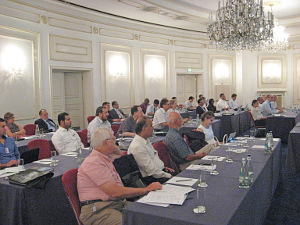
This emphasis on dissemination of knowledge differentiates WIT from other Institutions in research and academia, with which WIT collaborates rather than competes. This has led to the organisation of joint projects and postgraduate training with many organisations throughout the world.
The current strategy of WIT – Carlos explained – is to increase its different activities available at the Institute, improving the facilities in its New Forest National Park campus. This has led to the construction of a sports centre, with indoor swimming pool and the upgrading of accommodation and offices.
Prof Anca Marinov, Co-chair of the meeting then welcomed the delegates to Bucharest. She also recounted to the delegates the experience she had during the 2011 ECOSUD conference that took place in Alicante, where she had a major incident and found everybody most helpful. It was nice to see a large group of Alicante researchers participating in this conference and she hoped that they would have time to see some of the many interesting sights offered by Bucharest, a city that has developed rapidly in the last few years.
Conference Topics
The conference programme covered a number of state of the art topics and the papers were grouped under the following headings:
- Environmental Economics
- Modelling
- Sustainable Development & Planning
- Ecosystems and Change
- Energy and the Environment
- Water Resources Issues
Invited Presentations
There were a few invited presentations to enhance the proceedings, ie
‘Does the environment matter on the wine market: an analysis of the wine market in Austria’, by Petra Amrusch, University of Vienna, Austria
‘Numerical and regression models for the leaf area of tomato seedlings’, by Yolanda Villacampa, University of Alicante, Spain
‘Application of GSAP Microflush toilets: a sustainable development approach to rural and peri-urban sanitation’, by Stephen Mecca, Providence College, USA.
‘Weed control in Mexican irrigation districts with light weight equipment’, by Ramon Lomeli, Mexican Institute of Water Technology, Mexico
Special Lectures
The meeting also benefited from two special lectures given in parallel on the topic of Energy and Sustainability:
‘Clean and sustainable electric energy in Romania’, by Anca Marinov, University Politehnica of Bucharest, Romania
‘Sustainability of combustion and incineration of renewable fuels: example of Sweden’, by Rolf Sjöblom, Tekedo AB, Sweden
Prigogine Award 2013
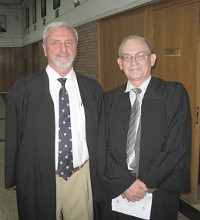
The Prigogine Medal was instituted by the University of Siena in Italy and the Wessex Institute of Technology in the UK in 2004 to honour the memory of Professor Ilya Prigogine, Nobel Prize Winner for Chemistry and Honorary Chair of ECOSUD until his death in 2003.
Ilya Prigogine was born in Moscow in 1917 and obtained his undergraduate and graduate education in Chemistry at the Free University of Brussels. He was awarded the Nobel Prize for his contribution to non-equilibrium thermodynamics, particularly the theory of dissipative structures. The main theme of his scientific work was the role of time in the physical sciences and biology. He contributed significantly to the understanding of irreversible processes, particularly in systems far from equilibrium. The results of his work have had profound consequences for understanding biological and ecological systems.
Prigogine’s ideas established the basis for ecological systems research. The Prigogine Medal to honour his memory is awarded annually to a leading scientist in the field of ecological systems. All recipients have been deeply influenced by the work of Prigogine.
Previous Prigogine Gold Medal winners were:
- 2004 Sven Jorgensen, Denmark
- 2005 Enzo Tiezzi, Italy
- 2006 Bernard Patten, USA
- 2007 Robert Ulanowicz, USA
- 2008 Ioannis Antoniou, Greece
- 2009 Emilio del Giudice, Italy
- 2010 Felix Müller, Germany
- 2011 Larissa Brizhik, Ukraine
- 2012 Gerald Pollack, USA
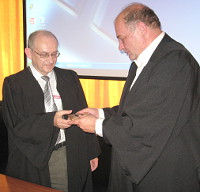
The recipient of the 2013 Award was Prof Vladimir Voeikov, Professor of Bio-organic Chemistry at Lomonosov Moscow State University, Russia.
Vladimir received his degree at Moscow State University and a PhD in Biophysics at the same institution, completing after that a further doctorate on Biological Sciences.
Since then he has been carrying out outstanding research at the Moscow Academy of Science, Duke University and Moscow State University. He is renowned in the field of physical and chemical properties of water and aqueous systems providing for the biological role of water in bioenergetics, in particular, in aerobic respiration, functions of reactive oxygen species in regulation of biological functions and in bioenergetics.
Vladimir is the author or co-author of more than 250 publications including 100 papers in scientific journals, as well as five books and monographs.
He is a member of the renowned Institute of Biophysics in Neuss, Germany and of the all-Russian Biochemical Society as well as an Editor of the Journal on Water, a multi-disciplinary research journal.
Vladimir was awarded the medal by the Rector of the Politehnica of Bucharest and after this he proceeded to deliver his special Prigogine Lecture entitled ‘The Key Role of Stable Nonequilibrium State of Aqueous Systems in Bioenergetics’, the abstract of which is as follows:Nearly 80 years ago the founder of Theoretical biology Ervin Bauer formulated Fundamental Principles to differentiate between animate and inanimate systems. The major Principle defining the living state of matter is the Principle of Stable Non-equilibrium, ‘No living system is ever at equilibrium. It ceaselessly performs work against equilibrium, demanded by the physical and chemical laws appropriate to the actual external conditions’. From this and a few other fundamental principles all the life manifestations automatically follow. Essentially a living thing is envisaged as an active and coherent free energy rich unit that uses all its energy for the preservation of its non-equilibrium state. Sustainability of the living state in time and space is provided by its intrinsic ability for the continuous buildup of free energy stock it possesses expressed in terms of evolution.
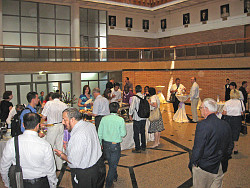
However, the origins of the initial conditions that allow for the process of a living system to emerge and for the global life to develop incessantly are omitted from Bauer’s theory. Furthermore, the matter that resides in a stable non-equilibrium state (“living matter”), possessing structural energy and performing useful work, has only very loosely been defined. In this assay we’ll show that recently discovered unique properties of water allow considering Real Aqueous Systems as living systems because they fully meet all the requirements of Erwin Bauer’s principles. Hence life in all its forms is the necessary consequence of the unique properties of this widespread substance – Water.
The full text of his lecture has been published in the International Journal of Design and Nature with Ecodynamics, Vol 8, Issue #2 2013.The lecture was followed by Prof Brebbia’s remarks congratulating Vladimir for his excellent presentation which clearly explained the new direction of water research, following the work of previous Prigogine medallists such as Profs del Giudice, Brizhik and Pollack.
After the event, the participants were invited to a buffet lunch at the Politehnica before returning to the Intercontinental Hotel where the other sessions were held. This hotel is one of the iconic buildings in Bucharest, very well located in the centre of the city and next to its old quarter, a place full of good restaurants, bars and cultural sites.
Social Occasions
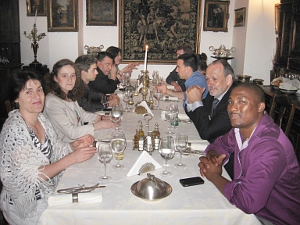
The conference banquet took place in a unique restaurant which captures the spirit of Bucharest during the ‘belle epoque’ when it was influenced by the French culture. The excellent meal and the good Romanian wines were accompanied by a delightful international show, making the night very special.
The International Scientific Advisory Committee of the conference met over dinner in a well known restaurant serving typical Romanian dishes with an excellent folkloric dance and singing show. The Chair was grateful to all of them for their help is reviewing abstract and papers ensuring in this manner the success of ECOSUD/13.
Conference Proceedings
The proceedings of ECOSUD 2013 - Ecosystems and Sustainable Development IX, 348pp (Print ISBN: 978-1-84564-726-1; eISBN: 978-1-84564-727-8) are available from WIT Press. Orders can be placed on the WIT Press web site at www.witpress.com or by email:
Papers from the conference will also be hosted online at the WIT eLibrary as Volume 175 of WIT Transactions on the Ecology and the Environment (ISSN: 1746-448X, Digital ISSN 1743-3541). For more details visit the WIT eLibrary at http://library.witpress.com


 Wessex Institute
Wessex Institute